Uncommon Leaders

olarseven / IIIerlok_xolms / Shutterstock.com.
Compassion and kindness are critical skills for good managers at any time but during this unprecedented year of insecurity and difficulties, being able to show care and concern for employees is of paramount importance. While all managers need business skills like decision-making and problem-solving, those who remember that employees are people first will win their enduring loyalty and dedication.
This summer, PPB opened nominations to identify the best bosses among those working for PPAI member companies. From the more than 50 individuals nominated and evaluated, these 10 rose to the top based on the qualities, management styles and leadership examples shared by their direct reports.
Executive coach and author, Joel Garfinkle, says that when you learn to lead with compassion, you can dramatically increase trust and unity within a team. By showing compassion, building trust and putting people first, these 10 PPB Best Bosses are celebrated among leaders.
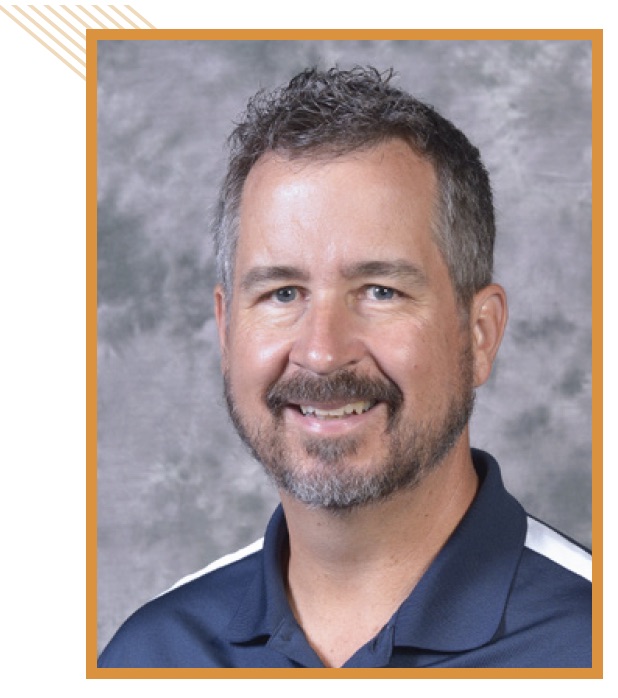
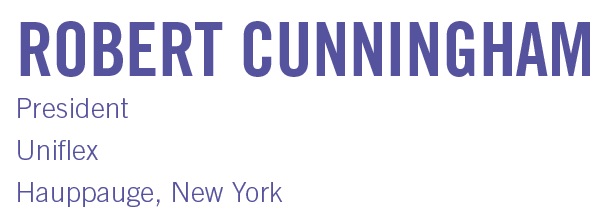
Before Robert Cunningham joined supplier Uniflex 25 years ago as an artist, he was a graphic designer working for a variety of agencies. While in college, he worked as a designer, caterer, ski instructor and in construction to pay the bills. He says he’s held leadership positions most of his work life, ranging from supervising a few employees to more than 100.
Those who nominated him cited his ability to allow his sales team to work independently while remaining available to lend support and guidance as needed. “As a salesperson in the Uniflex division, Rob allows us to own our business from sales contact to negotiation to winning the sale and processing the order. If needed, he is there to help in any of the stages,” says Neil Sklar. Francine Carlino says, “Rob is always available to lend support and guidance, while at the same time lets me be an autonomous salesperson. He wants you to succeed and do well and will help you to achieve that in any way he can.” Cunningham is also described as a kind and compassionate person who’s not afraid to show he cares. “I ended up in a hospital while at an industry trade show and he stayed with me for a few days after the show and took me home,” says Michael Burger. “[In doing so] he missed his surprise 50th birthday [party] that his family was going to have for him. That’s what makes him different.”
Robert Cunningham on his best boss. I would say I have had some great bosses as well as some real bad ones. But I have learned something from each and every one of them. Understanding what works and what doesn’t is important in shaping yourself as a leader.
The most valuable lesson he’s learned from managing others. I have learned as a leader to listen more. Learning to empower people and listen to what they have to say will help you achieve your goals a lot faster and build a powerful team.
His best advice for being a great boss. Communicate! It’s a trait that I try to improve on all the time. Share your vision and your passion with your teams. Talk to them, not at them. Create a collaborative environment and invite ideas.
–––––––––––––––––––––––––––––––––––––––––––––––––––––––––––

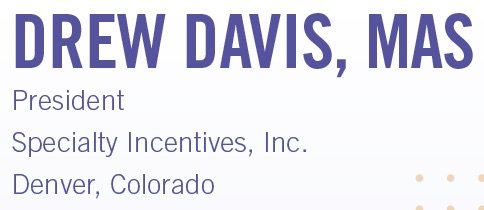
Drew Davis, MAS, is described by his nominators as a dynamic boss and a great communicator with a positive attitude. “I’ve always seen the greatness in him, but especially now, during the pandemic,” says nominator Lori Strike, a seven-year employee. “He has put his whole self into ‘flying the plane’ per se, to keep all his employees calm, motivated, focused as best as possible, and lifting spirits professionally and personally while we are all moving through these difficult times together.”
Five-year employee and nominator Heather Taylor says, “Drew is awesome at communication. Even though we are not all together with the social distancing going on, he has purchased cameras for all staff to be able to stay in front of each other and support being together while we are apart. He holds frequent calls with all staff members to update them on things going on and celebrate the successes of all.”
Nominator Dan Zyla, who’s been at Specialty Incentives for two years, likes how Davis cares about employees, especially when he asks about his family members using their first names. “Drew considers himself one of the team members and not the mighty owner of a company. He is kind-hearted and fair to all of his employees. And his door is always open regardless if it is something personal or about business.”
Davis came to work at his family’s company in 2000 after earning a master of business administration degree from the University of Florida. Previously, he worked for Time Warner Cable’s Construction Division at their St. Petersburg, Florida, CATV system upgrade project after earning his bachelor’s degree. He has managed others for 25 years but after becoming president at Specialty Incentives in 2014, he says he’s had the greatest number of direct reports with the broadest range of responsibility in his career to date.
Drew Davis on his best boss. My dad, Bob Davis, was one of Specialty Incentives’ founders and would never say he was your “boss.” Instead he’d say, “We work together.” This is a phrase I have openly taken from Bob’s playbook as all of us at Specialty Incentives work together. Bob was my mentor, provided opportunities for me to fail and succeed, was encouraging and critical when appropriate, and took great joy in my personal development and finding my own place within our industry. He never asked for anything but one’s best effort.
The most valuable lesson he’s learned from managing others. As individuals, we are so much more than what we accomplish at work each day. Remember, everyone in the company has interests and talents outside of the workplace that they bring with them to work every day. Learn to tap into those interests, as not doing so can result in folks feeling underutilized.
His best advice for being a great boss. Seek out and explicitly ask for the input of your team on not only the significant business decisions being made, but also those that seem not so significant. Communicate frequently the business’ initiatives, celebrate its successes and empower people to make decisions within their area of responsibility. You don’t have all the answers and aren’t a fortune-teller.
–––––––––––––––––––––––––––––––––––––––––––––––––––––––––––
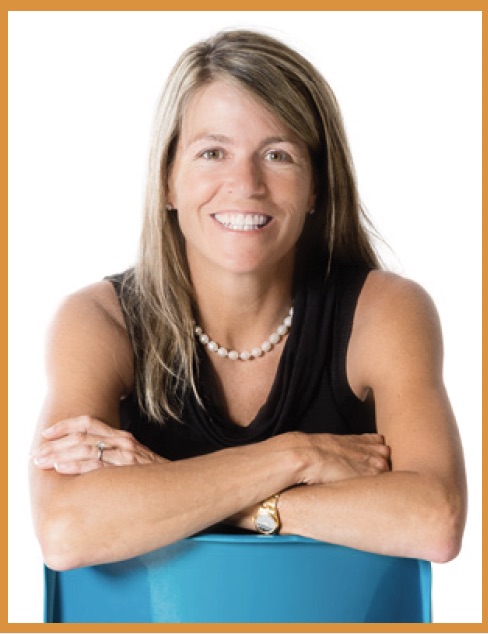
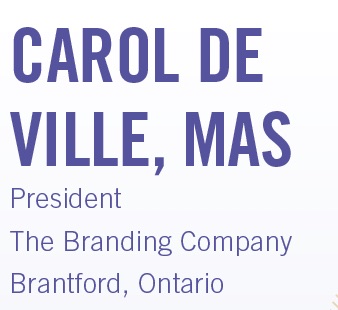
Carol de Ville, MAS, was first introduced to supervising others—and to the promotional products industry—at a young age while working at The Royal Bank of Canada. In 1993, she was approached by an Ontario distributor to join the promotional products industry and never looked back. She liked what she saw about the industry and, in 1993, she went to work for a local distributor. In 2008, she opened The Branding Company—a one-stop-shop for promos and incentives for the Canadian marketplace. Through the years, she has continued to hone her management skills. “What a magical and profound journey it continues to be—as exciting as the day I started. As the years go by, you learn more and more, and I look forward to the next decade ahead,” she says. de Ville’s optimism and energy are contagious. “You only have to be around Carol for less than five minutes to recognize and enjoy the excitement and enthusiasm she has for life,” says 10-year employee and nominator Pamela Mulvey, MAS.
She says de Ville is also a strong proponent for industry education and certification. The TBC team accounts for more than six percent of all industry credentials in Canada. de Ville has five Promotional Product Professionals of Canada (PPPC) Momentum Award winners among them along with 23 PPPC Image Awards. de Ville sets good examples of volunteerism having held top leadership positions on the PPPC board, Promotional Products Education Foundation board, Incentive Marketing Association, Women’s Empowerment Event (WEE) and the local D.A.R.E. board. She’s also a PPPC Hall of Fame inductee. But what Mulvey really admires about her boss is her management style.
“Carol’s philosophy is ‘spilt milk.’ [She says] ‘You can’t put it back in the bottle, so how do we clean it up?’ When a situation arises that requires management attention, Carol’s call to action is simple: provide three solutions to the issue. Using this outlook allows our team to become stronger using our own thoughts and problem-solving skills. By the time you have thought about the three solutions, you have thought out the issue, the way to fix it and have plans for a new process to be implemented,” says Mulvey. “Carol has built this company from the ground up and has empowered her team to build it with her. She takes all ideas and suggestions to heart and provides creative feedback when discussing an issue. She’s a true leader.”
Carol de Ville on her best boss. My manager at The Royal Bank of Canada. He always challenged my thought process and showed me how to set goals and visualize success.
The most valuable lesson she’s learned from managing others. Always ask questions to identify the root cause. Compromise and create solutions collectively. Talk the talk and walk the walk—be real. At TBC, we have a philosophy and process on how we manage challenges—always come up with three solutions and then pick the solution you believe is the best solution given the scenario. As an individual, I know you will select wisely once you have determined your path and I will stand behind your chosen decision.
Her best advice for being a great boss. You have two ears and one mouth—always listen twice as much as you speak. Lead by example, be a great mentor and no problem is too small. You can often hear me say ‘Spilt milk!’ Move forward—you can’t change what has happened, but you can influence and control what will happen next. Create a great environment, appreciate your team, trust their intuition, respect each other and, above all, be kind.
–––––––––––––––––––––––––––––––––––––––––––––––––––––––––––

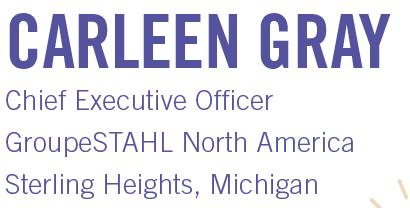
“You could say my first and third jobs were at Stahls’,” says Carleen Gray. “People work here, leave and come back after some outside experience. Another common theme in the company—we retire people after decades of experience here. We consider this to be part of our legacy.” Gray says there was a six-year period (outside of Stahls’) when she worked in the automotive industry and she never dreamed her decorated apparel experience would help her there, but it was crucial in managing the Jeep, Dodge and Chrysler licensed merchandising programs. “My entire career has been deeply entrenched in building brands and helping people grow their businesses, with a focus on decorated apparel. I’ve worked with and learned from many industry visionaries and leaders in my tenure at Stahls’.”
Gray’s first substantial leadership role at Stahls’ was as marketing director, and she’s also been vice president, executive vice president and chief marketing officer, roles that helped her hone her management skills. “It’s been an honor to work with and manage people I’ve known for years. I can genuinely say I’ve grown up with many of them,” she says.
Nominator Karin Bellinghausen, who’s worked with Gray for more than 20 years, says, “My favorite thing about Carleen’s management style is that she is a hands-on manager who knows the industry and knows all her people. Carleen doesn’t just talk the talk, she walks the walk. When one of our divisions was in a time crunch for a very important project, Carleen was right there, with others, in the production line getting the job done. She stands with and supports her team members at all levels. She truly cares.”
Six-year direct report and nominator Victoria Nardini says, “She provides me the opportunity to present solutions. She prefers a collaborative work environment, and I have always felt empowered to bring my ideas to the table. They may not have all been slam dunks, but she keeps me motivated to try again by reminding me of the wins.”
Carleen Gray on her best boss. Without question, [company founder] Ted Stahl has been a guiding force, inspiration and mentor from the beginning. He’s shown me the importance of fostering a family-like culture with team members. A true entrepreneur and innovator, his obsession with helping our customers succeed is something which drives me to do the same. And we certainly both agree, the only way to predict the future is to invent it.
The most valuable lesson she’s learned from managing others. Never forget the fundamentals—the basics. Know the names of the people at the company, be kind, be respectful, be nice. People appreciate recognition and positivity. No matter how large the team or the company gets, maintain the spirit and heart of a small company. Every job counts, every role is important, we need each other to succeed.
Her best advice for being a great boss. Be proactive and irrationally optimistic. Plus, you should always try to hire or work with people smarter than you. The ability to face challenges head-on is easier with the right team. So much of my confidence as a leader comes from knowing the team’s strengths and understanding where to go for results.
–––––––––––––––––––––––––––––––––––––––––––––––––––––––––––
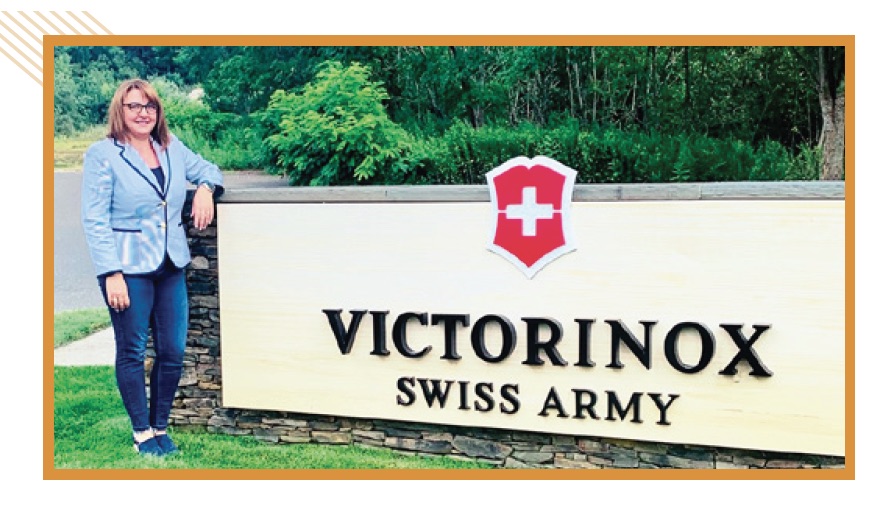
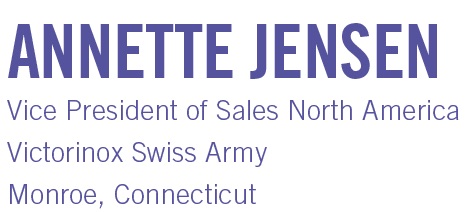
With a finance degree from Southern Connecticut State University, Annette Jensen was working as a financial services account manager at Prudential Securities when she realized it wasn’t the right industry for her. “I searched for a new career and found that Victorinox Swiss Army had some great opportunities and was a fast-growing company. Twenty-six years later I am still in the promo products industry and enjoying every minute of it,” she says about the fourth-generation, family-owned supplier. She’s managed others for more than 20 of those years, starting in the customer service department and working her way up to vice president.
“Annette is a boss who is able to recognize the strengths in her employees and apply them to their fullest extent,” says nominator Stephanie Sage, who’s reported to Jensen for almost two years. “She taught me to look at people as individuals and to understand that almost everyone has something positive to offer. She is easy to talk to, understanding and supportive. I could not think of a boss more deserving than Annette Jensen.” Janet Jones, another of Jensen’s four nominators, says, “She is admired and appreciated by all who work with her. She leads by example and with a great sense of humor. Annette expresses interest in each of us, providing the tools we need to continue to grow in this industry. She advocates, supports and provides creative ways to meet our accomplishments. In all my years with this company, I’ve never met anyone who does not speak highly of Annette Jensen.”
Annette Jensen on her best boss. My best boss was Andy Peabody at Victorinox Swiss Army. He was a true mentor and wanted his team to always perform at a high level and had high expectations of his team and most importantly of himself, too. There was no ‘I’ in his team. He taught me much of what I know about this industry and for that I will forever thank him for the opportunities he gave me. (Ironically, he is now one of my customers!)
The most valuable lesson she’s learned from managing others. I have learned to be a better listener. Over the years, I better understand the needs of individuals, the need for recognition and the power of consistency. Good direction with a strong team equals success. And when we do fail, we learn from it and do better next time.
Her best advice for being a great boss. I would say be consistent, set goals and allow your team to be autonomous. I have high expectations, but they know what they are. I give my team the opportunity to work independently and empower them to own their roles. Give clear direction, listen to your team, be a team player and being a great boss is easy. Without a great team there is no chance to be a best boss.
–––––––––––––––––––––––––––––––––––––––––––––––––––––––––––
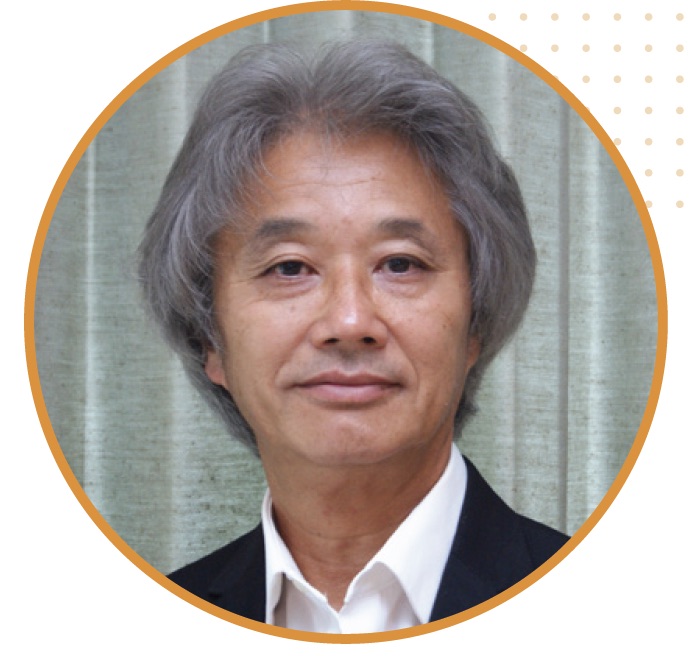
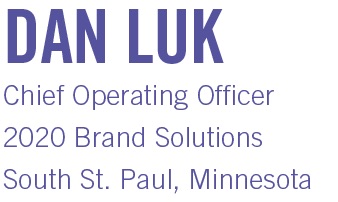
Before finding his way into the promotional products industry four years ago, Dan Luk spent more than three decades in high tech, marketing, printing and publishing, and working for customer satisfaction, research and assessment companies. Managing others was a responsibility he grew into. “Although I have been a project leader, manager, director, vice president for a number of years and am currently chief operating officer, I’ve been practicing servant leadership or the inverted pyramid leadership model for probably the past 10 years,” he says. “In a servant leadership model, the key aspect of my job is to serve my team. I, therefore, work for them to clear the way for everyone to be successful, and in turn, for the organization to succeed.”
It’s a leadership style that doesn't go unnoticed by his team. “Dan doesn’t consider himself a boss, he is first and foremost a servant leader,” says nominator Mandy Shearer, who has reported to him for three years. “Dan cultivates the best work environment. I know he has my back; he’s there to support me, challenge me, help me achieve my goals and ensure work-life balance. This sentiment would be repeated by all within the organization, not just me.”
Shearer continues, “Without Dan’s strategic insight, many of us wouldn’t be where we are today. For me, he’s been the driving factor in my professional growth in the past two years. He recognized the need for a new project management role in our organization and that I was the right internal hire for the role. He took the time to acknowledge my talents and skills to set me on a path to champion innovation within our organization. It is with this leadership style that he has earned respect and trust from all, which has been very important during these challenging times.”
Dan Luk on his best boss. I don’t have a best boss, rather I’ve had many great bosses. They all had different viewpoints, ways in handling situations and diverse things to offer. My philosophy is that there is always something I can learn from practically anyone.
The most valuable lesson he’s learned from managing others. Despite research, I maintain management is not a science. As much as I’d like to believe I can anticipate how someone is going to act or react, I’ve come to learn that everyone is truly unique and motivated by different factors. It is always best to leverage someone’s strengths rather than focusing on someone’s weaknesses.
His best advice for being a great boss. Everyone in the organization has common objectives. Everyone plays a designated role. The only difference of being a “manager” is that you play a different role.
–––––––––––––––––––––––––––––––––––––––––––––––––––––––––––
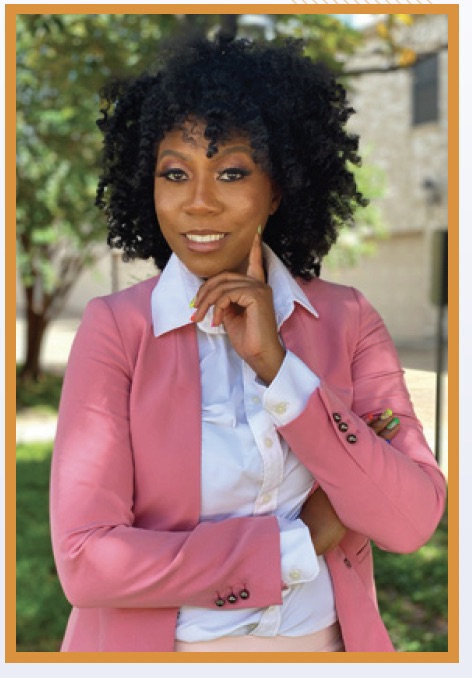
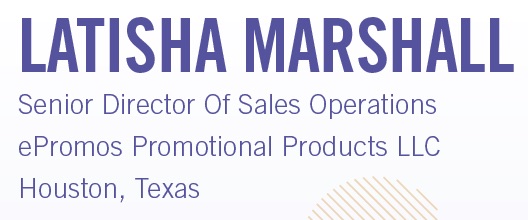
While earning her degree in business administration from Pace University, Latisha Marshall spent four years as a Smart Start Intern at JPMorganChase where she worked in several departments including IT and credit card services. After college, she joined St. Cloud, Minnesota-based ePromos Promotional Products as pre-production coordinator supporting several sales reps and processing credit cards for clients, among other responsibilities. As she proved herself, Marshall was promoted six times during her 16 years at the distributor and today, heads up sales operations. She’s been managing others for 13 years.
Julie Gray, one of three nominators, has reported to Marshall for six years. “Tish is an amazing boss with the ability to filter through the noise and get to the heart of a problem,” she says. “She is a great communicator and disseminates information in a way that is easy to understand and gives clear instructions to follow. She also allows you to work independently (as long as you’ve earned her trust) and doesn’t micro-manage situations. She is there if you need her both professionally and personally.”
Nominator Misty Goebel has worked with Marshall for more than nine years and calls her boss a creative problem-solver. “She makes sure to think inside and outside of the box whenever there are problems to solve. She makes her choices based off facts and stats to be sure the right thing is done for the business. And she works hard to lead by example.”
Latisha Marshall on her best boss. It has truly been a village that has contributed to the individual I am today. I have had the privilege of working with many pioneers in this industry. They have been supportive and inspiring, allowing me to be the best version of myself. Due to that guidance, I know the significance of how a person can impact one’s journey.
The most valuable lesson she’s learned from managing others. “I’m not a businessman. I’m a business, man. – Jay-Z” I identify with this quote so much because, like [HR blogger and author] Tim Sackett so beautifully wrote, “It is important to be 100-percent authentic, completely committed and passionate about what you do.”
Her best advice for being a great boss. Never give up! Think as big as the boss. Work as hard as the employees. Remain as humble as the interns.
–––––––––––––––––––––––––––––––––––––––––––––––––––––––––––
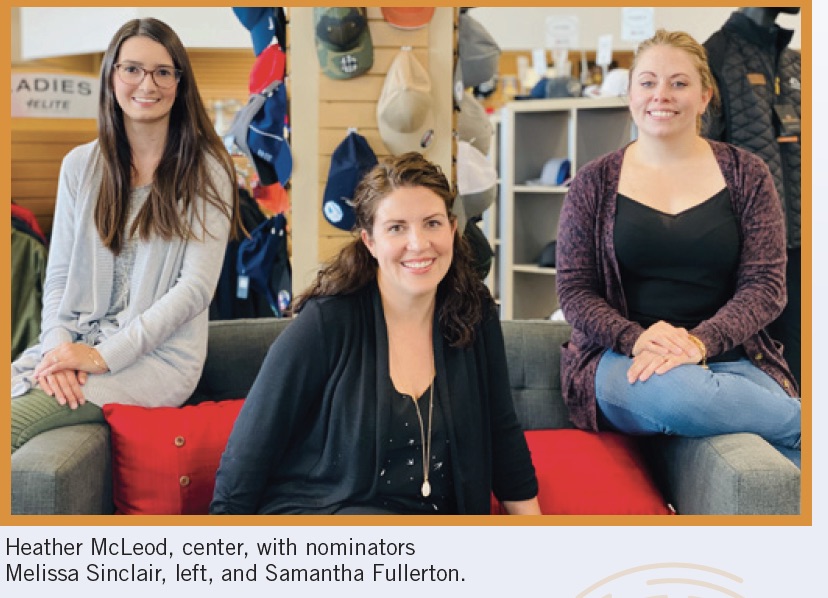

Heather McLeod has been working at her family’s business for as long as she can remember. The Western Canada-based distributor was founded 60 years ago by Cecil Bishop and today, there are four locations. She started working at the original store as a young girl, but it was important to her father that she have other job experiences too, so she went to work for the City of St. Albert for 10 years in a variety of roles including swimming instructor, customer service representative and division finance assistant. She also briefly sold radio advertising before rejoining Elite as an outside sales consultant in 2000.
What’s remarkable about McLeod’s management skills is her ability to explain decisions, even difficult ones, to her team and help them feel a part of the process. “Whether it’s good news or bad news, Heather always takes the time to explain the situation and why the decision was made,” says nominator Melissa Sinclair, who’s worked for McLeod for three years. “Taking the time to explain things allows us on her team to understand company decisions better and be informed. Her door is always open for anyone to talk to her about situations, troubles, successes or outside work life.”
Nominator Samantha Fullerton says, “Heather allows each team member to focus on what they do best. She truly understands what it takes to manage a sales team, by taking the time to understand what motivates each salesperson and working with them to reach their individual goals both personally and professionally. I have not had a single ‘no’ from Heather since beginning to work at Elite because she works to see the value in the ideas being presented. Every contribution from a team member is recognized, every success is celebrated, and every learning moment is taken as just that, rather than as a criticism.”
McLeod is also treasured for taking the time celebrate her team’s successes—both big and small. “On top of the annual sales team awards she gives out, she constantly keeps an eye on projects being worked on and orders being entered, and always congratulates reps on day-to-day activities like finalizing a nice sale, making contact with a prospect or pitching a ‘wow’ product to a client,” adds Sinclair.
Heather McLeod on her best boss. My best boss was one of my old sales managers. I loved the energy and excitement that she brought about every sales opportunity we had. She provided valuable experience and feedback, was always professional and genuinely cared about helping make her team successful. We have stayed in touch over the years and she is now my mentor.
The most valuable lesson she’s learned from managing others. I’ve learned that giving constructive criticism is exceedingly difficult for me, but if I do not give the feedback, I’m not helping that individual have the opportunity to grow and improve.
Her best advice for being a great boss. Treat others how you want to be treated. By showing respect, caring for your team and listening to their thoughts and ideas, you cultivate a strong and loyal team with common goals, and that will lead to success.
–––––––––––––––––––––––––––––––––––––––––––––––––––––––––––

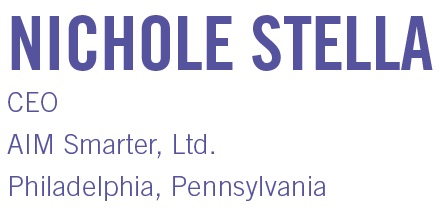
Nichole Stella began her career in B2B publishing and later moved into management, taking on increasing responsibility with publisher NAPCO Media. After almost 12 years at the company, she joined the Altitude Group, parent company of distributor AIM Smarter, in 2017 and was named CEO of AIM in 2019.
Nominator Megan Beisser worked for Stella for five years at NAPCO and now reports to her at AIM. “She inspires everyone around her with her business brilliance, unparalleled work ethic and genuine enthusiasm for the promo industry,” says Beisser. “She empowers the many women working at AIM Smarter and pushes all of us to be our best and to accomplish our goals. Working with Nikki, I have seen firsthand how everyone in the industry respects and admires her. I truly believe she is unmatched in her support of women in the industry.”
Nominator Stacy McConnell, who has reported to Stella for almost three years, says, “Her drive and passion for success in everything she does have taught me to never give up on your goals, to stay focused on the end result and know that obstacles in the process are just tiny pause buttons to allow the team to refocus and work together, to be true to who you are and, best of all, that family is always first, always.”
Another of Stella’s six nominators, Laura Coggeshall, says her boss inspires her every day. “She shows genuine care for those in her employ, and I see how she values people above and beyond everything else. She has a heart of gold and demonstrates true empathy. Nikki is also a visionary, always seeing what is possible and the true potential in any circumstance. I’m proud to follow her leadership.”
Stella recalls that she has always enjoyed leading teams and has held managerial roles since she was 17. During high school and college, she worked as a supervisor at a facility for kids with special needs. “It’s here that I learned the work that I did was more than a job. It had impact and meaning for the people that I served and for me as well. From that point forward, I always managed teams in some capacity,” she says.
Nichole Stella on her best boss. My grandfather was a tremendous influence on me and the way I approach business, leadership and teams. He was a true entrepreneur, owning a large car dealership in a suburb just outside of Philadelphia. I grew up helping out in his showroom, assisting during events, counting inventory on Saturdays and answering phones. He worked really hard, led by example and was always driven to provide a second-to-none experience for his customers. He knew that a great customer experience required two things: a great product and a great team of people guiding customers every step of the way. He had high expectations but was humble and always recognized the efforts of his team. I still have mugs and t-shirts from those days. He also loved a great promotional product to give to his customers.
The most valuable lesson she’s learned from managing others. I try to harken back to my grandfather’s belief in the importance of a great team. Having done the work to assemble a great group of people, it is so important to let them shine. Steve Jobs said it best, “It doesn’t make sense to hire smart people and then tell them what to do; we hire smart people so they can tell us what to do.” I work hard to foster an environment of collaboration, lead by example, offer counsel and guidance, be fair-minded and always recognize great work when I see it.
Her best advice for being a great boss. Allow your team to shine, always take the time to acknowledge great work and show respect for individual team member differences, skill sets and knowledge—this will drive morale, innovation and, ultimately, unified success.
–––––––––––––––––––––––––––––––––––––––––––––––––––––––––––

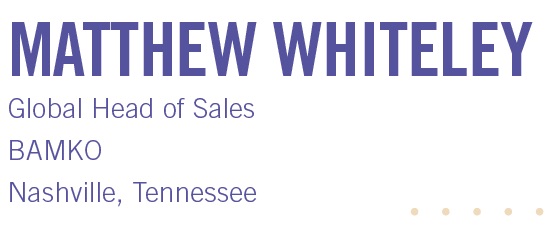
Matt Whiteley has been managing sales teams for more than a decade. During his nearly 20-year career, he’s managed sales and business development for several companies in the software industry before joining distributor BAMKO in 2017. At his most recent previous employer, he led three separate sales organizations housed under one corporate umbrella. BAMKO, based in Los Angeles, has hundreds of employees in 11 cities across four continents. “My experience managing software sales offers me a unique perspective on the sort of solution-based selling that is becoming increasingly important in our industry these days,” Whiteley says.
Lindsay Alcorn, one of four nominators, calls her boss a teacher, a doer, a therapist and a winner. “I have never wanted my sales manager to attend a client meeting with me in the past,” she says. “With Matt, I rearrange my meetings to make sure he is there. The value he brings is absolutely amazing.”
Nominator Dana Sussman appreciates Whiteley’s leadership style. “I consider my boss to be one of the best because he leads from the front. He is always the first person to volunteer to get on a plane for a meeting or a call to help me try to close a deal. I’ve never had a boss who invested in my financial success before.”
Her co-worker and fellow nominator James Silberman shares a similar sentiment about Whiteley. “He is excellent at identifying why we are having trouble closing a specific program and addresses the issues head-on. Most importantly, he walks the walk. Matt doesn’t ask us to do anything he won’t or does not do himself.”
Nominator Brett Marz adds, “He’s so humble. He just does the work. He’s the hardest working guy in our organization. When he pushes me to work harder for my own success, it comes from a very authentic place. He’s working so hard for me; how can I refuse to work hard for myself?”
Matthew Whiteley on his best boss. My best boss has been BAMKO’s President Phil Koosed. He has empowered me to be the best version of myself. Phil is a great communicator, sets clear expectations and leads through service. He sets a great example for me and the rest of our management team. Phil challenges us to set high expectations for ourselves and then helps put us in a position to meet or exceed those expectations. BAMKO’s performance over the past few years isn’t a coincidence. We help people get more out of themselves and Phil has certainly helped me find another gear.
The most valuable lesson he’s learned from managing others. The most valuable lesson I have learned in managing others is that there are three sides to every story, “yours, mine and the truth.” The truth lies somewhere in the middle. This helps me come to conversations and discussions from a position of understanding rather than a place of judgement.
His best advice for being a great boss. The best piece of advice for being a great boss that I consistently give is to lead by example. I will never ask my team to do something I have not done, nor will I ask them to do something I would never do. I have found that making myself available and putting them first shows that I am willing to do what it takes, that I am willing to get in the trenches with my team and demonstrates that we are in this together.
–––––––––––––––––––––––––––––––––––––––––––––––––––––––––––
Tina Berres Filipski is editor of PPB.

